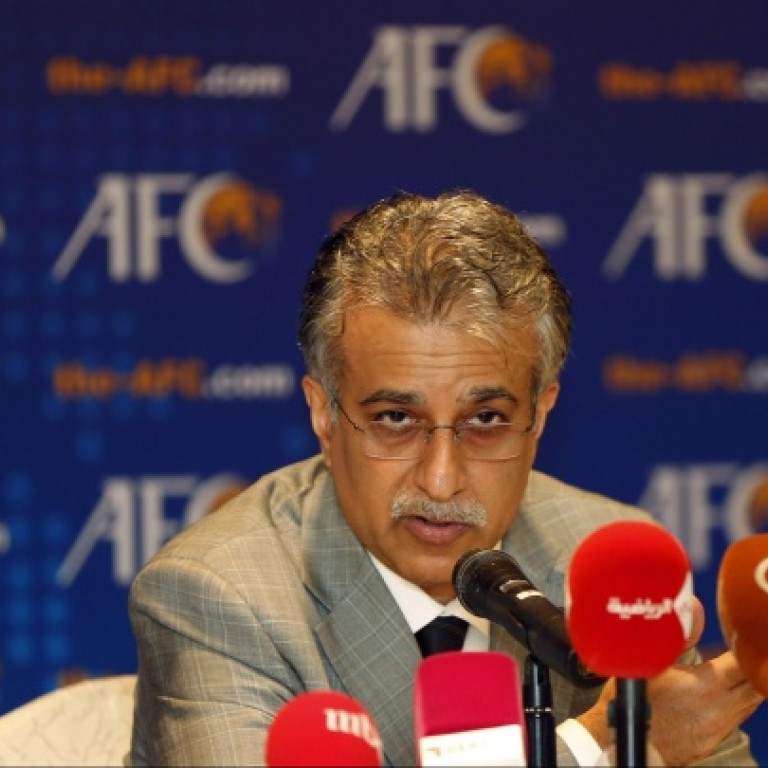
New AFC chief denies allegations of human rights abuses after election
After landslide election victory, defiant Bahraini challenges critics to show evidence of claims
Bahrain's Sheikh Salman bin Ibrahim al-Khalifa fought back against allegations of human rights abuses yesterday as he became Asian soccer's new leader with a landslide election win.
The royal, who has also denied vote-buying claims, won 33 of the 46 votes to become president of the Asian Football Confederation (AFC), replacing disgraced ex-leader Mohamed bin Hammam.
With Yousuf al-Serkal of the UAE and Thailand's Worawi Makudi gathering just six and seven votes respectively, it was a crushing victory for Salman who will now complete Bin Hammam's term, which finishes in 2015.
The Bahrain football association chief also beat Qatar's Hassan al-Thawadi in a separate vote for a seat on Fifa's executive committee, giving him a voice at the top of the sport's world governing body.
"My mission is to reunite our confederation. My mission is to lead our family towards a future of growth and prosperity, a future based on good governance and integrity," Sheikh Salman said.
"Today, the Asian football family is at a crossroads. Today we have the power to erase a chapter in our history," he added.
Today, the Asian football family is at a crossroads. Today we have the power to erase a chapter in our history
Sheikh Salman was referring to the spectacular demise of Qatar's Bin Hammam, who challenged for the Fifa presidency, but was accused of bribery and then of financial wrongdoing in office. He stepped down last year and has been banned from all soccer activities.
The presidential election result was greeted by loud cheers and shouts in Arabic from the floor of the extraordinary congress, after a speedy process carried out at a plush hotel in the Malaysian capital Kuala Lumpur.
Sheikh Salman had been under fire before the vote over claims that the Olympic Council of Asia (OCA) was lobbying on his behalf. He faced similar accusations when he unsuccessfully challenged Bin Hammam in 2009.
Human rights groups also accused the sheikh of involvement in a purge of players and officials, who they said were then arrested and tortured, during Bahrain's crackdown on pro-democracy protests in 2011.
However, after his victory Sheikh Salman defiantly challenged his critics to produce evidence to back up their claims.
"You talk about allegations. But the question is, do you have proof?" he said.
"Somebody talks about government, I don't think this is our business in football. We are football people. If anybody has proof [that] the Bahrain football association has violated the statutes of Fifa or the AFC, let them present it."
The sheikh also promised to be a "strong leader" who would implement "principles of good governance at every level" and try to put Asian football in order after the messy end to the Bin Hammam era.
"What we need are concrete reforms, steps that can be implemented and measured. What we need is an AFC where the decision-makers are accountable," he said, promising to "clean up the past".
Fifa chief Sepp Blatter, heading a contingent of world football dignitaries in Kuala Lumpur for the vote, hailed the ballot's "total transparency".
"I wish [Sheikh Salman] a lot of success, a lot of patience. But also it's certain that Asian football is going to travel a difficult road now to renew this great confederation," he said.
Serkal, an AFC vice-president and head of the UAE football association, also said he had "no hard feelings" and would work with Sheikh Salman regardless of any meddling in the vote.
"Whether there was outside interference or wasn't outside interference, it's not for me to judge … even if there was, I will still accept the result," he said.
Claims of dirty tricks dominated the build-up, with the OCA accused of lobbying on behalf of Sheikh Salman, and Fifa expressing concern about allegations that Bin Hammam had also been active behind the scenes.
And former Saudi Arabian candidate Hafez Ibrahim al-Medlej, who withdrew from the race late yesterday, also suggested that Fifa had brought its influence to bear.
Australia's Moya Dodd was anointed as the AFC's mandatory female vice-president, and two other women - North Korea's Han Un-gyong and Palestinian candidate Susan Shalabi - earned seats on the body's executive committee.
As well as its internal problems, the AFC also faces a stiff challenge in reining in rampant match-fixing, which has blown up across the region.
Salman factfile
Name: Sheikh Salman bin Ibrahim al-Khalifa
Born: 1965, Bahrain
Roles:
AFC disciplinary committee chairman (2003-2009)
Fifa disciplinary committee deputy chairman (2003-2009)
Fifa 2014 World Cup committee member
Bahrain FA president (since 2002)
Bahrain FA vice-president (1998-2002)
Bahrain Olympic Committee vice president (since 2009)
General secretary Supreme Council for Youth and Sports (since 2010)
Manifesto pledges:
Reunite Asian football community
Safeguard universality of the Laws of the Game
Re-establish relationship between Fifa and AFC
Ensure full financial transparency
Guarantee equality in distribution of AFC commercial revenues
Improve level of AFC competitions
Introduce technology at AFC competitions
Reinforce financial support available for refereeing and coaching courses
Ensure women's football receives the support it deserves
Embrace the social responsibility the AFC has towards all members
